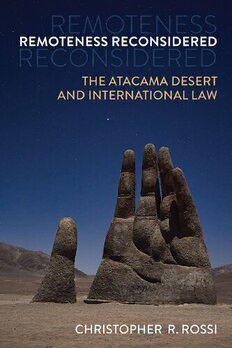
Remoteness Reconsidered: The Atacama Desert and International Law PDF
Preview Remoteness Reconsidered: The Atacama Desert and International Law
remoteness reconsidered remoteness reconsidered The Atacama Desert and International Law christopher r. rossi University of Michigan Press Ann Arbor Copyright 2021 by Christopher R. Rossi All rights reserved For questions or permissions, please contact [email protected] Published in the United States of America by the University of Michigan Press Manufactured in the United States of America Printed on acid- free paper First published July 2021 A CIP catalog record for this book is available from the British Library. ISBN 978- 0- 472- 13257- 7 (hardcover : alk. paper) ISBN 978- 0- 472- 12905- 8 (ebook) Cover photo: Iván A. Cortés Gómes. Mano Del Desierto sculpture by Mario Irarrázabal. For Nicholas “Christian” Contents Acknowledgments ix 1 • Introduction 1 The Path of This Book 11 2 • Remoteness Generally Reconsidered 15 Elements of Remoteness 24 Temporal Remoteness and the Problem of Periodization 26 A Nearby Example of Problematic Periodization: How Remote Is the Cold War? 28 International Law’s Struggle with Remoteness and Periodization 30 Two Current Problems of Remoteness: Globalization and the Anthropocene 35 Geographic Remoteness 38 Territorializing Remoteness 40 Lines and Maps 41 Doctrinal Remoteness 55 Demarginalizing the Desert 60 Conclusion 73 3 • Nomos 76 Carl Schmitt and Nomos 78 The Dynamics of Biogeography 85 Nomos and Ayllus 89 Spanish Incursions into the Atacama 94 4 • Guano and Nitrates 105 The War of the Pacific 112 viii • Contents 5 • Water 118 The Source of the Riparian Dispute 123 A Deep History of Tension 130 Psychological Effects of the War of the Pacific and Goffmanian Metaphor 132 The Importance of Metaphors and International Law 133 Dramaturgy 135 Ceremonial Profanations and Legal Vandalism 139 The Evolution of Transboundary Freshwater Law 142 Evolution of the International Law Defining Watercourse 142 The Watercourses Convention 143 A Clash of Interests: Sovereignty versus Watercourse Integrity 144 The Doctrine of International Servitude 145 The Absolute View: The Harmon Doctrine 146 The Restrictive Theory of Prior Rights 148 Rise of Equitable Use and Mutual Accord: A Community of Interest? 150 Conclusion 157 6 • Lithium 160 Competing Perspectives 172 Chile’s Economic Transition and “Lost Decade” 174 The Chicago Boys 179 Bolivia and Dependency Theory: The Antipode 192 Bolivia’s Alternative View of Extractivism 196 Lingering Effects of Bolivia’s Postcolonial Encounter 196 Bolivia’s Fitful Relation to Neoliberalism 199 Argentina and Neoliberalism 201 Conclusion 204 7 • The Spatial Turn, Extractivism, and Remoteness 208 Bibliography 217 Name Index 267 Subject Index 281 Digital materials related to this title can be found on the Fulcrum platform via the following citable URL https://doi.org/10.3998/mpub.11728155 Acknowledgments I forever remain grateful to librarians for valuable assistance, including Don Ford, foreign, comparative, and international law librarian at the Iowa Law College; Ellen L. Jones, university reference librarian; Brett Cloyd, university research and government information librarian; Ryan Moore, information specialist at the Geography and Map Division of the Library of Congress; and once again, Arthur E. Bonfield, associate dean for research emeritus and Allan D. Vestal Chair and former head law librarian at the Iowa Law College. I am also grateful to John Reitz, Edward Carmody Professor of Law and director of graduate programs and visiting scholars, and Adrien Katherine Wing, associate dean for international and comparative law programs and Bessie Dutton Murray Professor of Law, for unhesitatingly encouraging and supporting my research. I also thank Jonathan C. Carlson, Victor and Carol Alvarez Fel- low in Law, and Stella Burch Elias, professor and Chancellor William Gardiner Hammond Fellow in Law for comments on draft chapters. Iowa Law College students Thais Fernandes Pereira and Gada Al Herz helped to compile the bibliography, and Hsin- Yi “Sandy” Hsieh did a wonderful job tracking down errant or missing details and tending to bibliographic details. I also extend particular thanks to Charles Jones, emeritus reader in international relations at Wolfson College, Cambridge, for insightful and pointed criticisms, and cartographic historian Chet Van Duzer, for clarifying some oddities associated with Martin Waldseemüller’s amazing and curious early- sixteenth- century maps. I am grateful again to Arthur Bonfield for granting me access to his private collection of sixteenth- and seventeenth- century primary sources on the Age of Discovery, and for guiding me through the works of Samuel Purchas, Alexander Esque-
